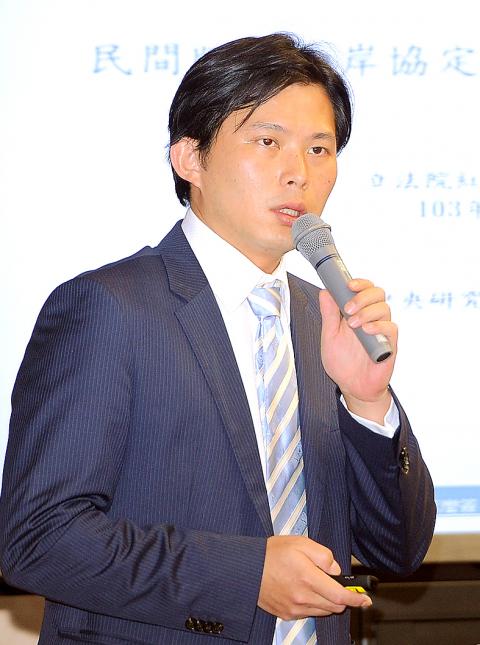An investigation team set up by the legislature’s Judiciary and Organic Laws and Statutes Committee that is scheduled to visit Academia Sinica tomorrow is an “intimidation measure,” said an associate research professor at the institution’s Institutum Iurisprudentiae.
Huang Kuo-chang (黃國昌) — a leading figure in the Sunflower movement — yesterday posted on Facebook two scanned copies of legislative documents that said the committee is scheduled to visit Academia Sinica tomorrow to inspect “the condition of its staffing levels and enhancements in performance after the institution’s restructuring.”
Huang said he suspects his attendance record is the target of the committee’s investigation team, “which, if true, would be a pretty cheap way to evaluate an Academia Sinica researcher.”

Photo: Taipei Times
“My academic performance is duly assessed by the professional community. I don’t think the committee needs to go to this trouble for a performance review. I hope they are not here to exert inappropriate pressure on the research institution,” he added.
Chinese Nationalist Party (KMT) Legislator Lu Hsueh-chang (呂學樟), who convenes the committee, said that the investigation is into the institution’s overall performance, rather than that of any individual.
“Why is Huang worried about the inspection? Does he have something to hide?” Lu asked.
“This is a public matter. Do not confuse it with private issues. [Huang] is also a civil servant, who still needs to perform his duties on time and undergo assessments of his work,” Lu said.
“Any violations against the Civil Servant Services Act (公務員服務法) would be dealt with,” he added.
Huang is not the only Academia Sinica researcher who supported the student-led Sunflower movement against the government’s handling of the cross-strait service trade pact, or criticized the government over the issue.
Institute of Sociology research fellow Chiu Hei-yuan (瞿海源) led about 200 Academia Sinica researchers and staff in a protest against President Ma Ying-jeou (馬英九) when he attended a conference at the institution last month on sovereignty disputes concerning the Tokyo-controlled Diaoyutai Islands (釣魚台), which Taiwan and China also claim.

NATIONAL SECURITY THREAT: An official said that Guan Guan’s comments had gone beyond the threshold of free speech, as she advocated for the destruction of the ROC China-born media influencer Guan Guan’s (關關) residency permit has been revoked for repeatedly posting pro-China content that threatens national security, the National Immigration Agency said yesterday. Guan Guan has said many controversial things in her videos posted to Douyin (抖音), including “the red flag will soon be painted all over Taiwan” and “Taiwan is an inseparable part of China,” while expressing hope for expedited “reunification.” The agency received multiple reports alleging that Guan Guan had advocated for armed reunification last year. After investigating, the agency last month issued a notice requiring her to appear and account for her actions. Guan Guan appeared as required,

Japan and the Philippines yesterday signed a defense pact that would allow the tax-free provision of ammunition, fuel, food and other necessities when their forces stage joint training to boost deterrence against China’s growing aggression in the region and to bolster their preparation for natural disasters. Japan has faced increasing political, trade and security tensions with China, which was angered by Japanese Prime Minister Sanae Takaichi’s remark that a Chinese attack on Taiwan would be a survival-threatening situation for Japan, triggering a military response. Japan and the Philippines have also had separate territorial conflicts with Beijing in the East and South China

A strong cold air mass is expected to arrive tonight, bringing a change in weather and a drop in temperature, the Central Weather Administration (CWA) said. The coldest time would be early on Thursday morning, with temperatures in some areas dipping as low as 8°C, it said. Daytime highs yesterday were 22°C to 24°C in northern and eastern Taiwan, and about 25°C to 28°C in the central and southern regions, it said. However, nighttime lows would dip to about 15°C to 16°C in central and northern Taiwan as well as the northeast, and 17°C to 19°C elsewhere, it said. Tropical Storm Nokaen, currently

PAPERS, PLEASE: The gang exploited the high value of the passports, selling them at inflated prices to Chinese buyers, who would treat them as ‘invisibility cloaks’ The Yilan District Court has handed four members of a syndicate prison terms ranging from one year and two months to two years and two months for their involvement in a scheme to purchase Taiwanese passports and resell them abroad at a massive markup. A Chinese human smuggling syndicate purchased Taiwanese passports through local criminal networks, exploiting the passports’ visa-free travel privileges to turn a profit of more than 20 times the original price, the court said. Such criminal organizations enable people to impersonate Taiwanese when entering and exiting Taiwan and other countries, undermining social order and the credibility of the nation’s